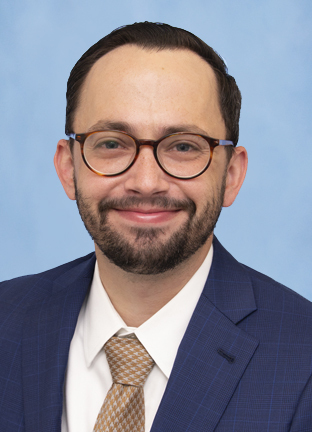
Hunter Underwood, MD joins the Division of Endocrine Surgery as an assistant professor. He completed his general surgery residency at NYU Langone Health and an AAES Endocrine Surgery Fellowship at Michigan Medicine. He attended Purdue University, Indianapolis as an undergraduate and earned a B.S. in Biochemistry before attending Indiana University School of Medicine. Dr. Underwood's research interests focus on understanding and enhancing endocrine surgery education at the resident level to improve outcomes for patients who may not have access to a high-volume endocrine surgeon. His clinical speciality is endocrine surgery, including thyroid, parathyroid, adrenal surgery. He is a member of the American Association of Endocrine Surgeons (AAES).
Get to Know Dr. Underwood
Q. Why Michigan Medicine? Tell us what excites you about being a part of the team.
A. Michigan Medicine has a distinct legacy of excellence within the realm of endocrine surgery developed by Dr. Norman Thompson, who developed both the nation's first endocrine surgery division and fellowship here at the University of Michigan. Furthermore, Michigan Medicine has substantial expertise in the fields on medical endocrinology, nuclear medicine, radiation oncology, genetics, and interventional radiology. Our combined surgical experience as well as excellent multidisciplinary collaboration ensures that endocrine patients at the University of Michigan receive highly specialized care - both in and out of the operating room.
Q. Why surgery? Tell us what led you down this path.
A. I was exposed to endocrine surgery early in my surgical training with Drs. Kepal Patel and Jennifer Ogilvie at NYU Langone Health in New York City. Their passion for endocrine surgery was contagious and after working with them I immediately knew that endocrine surgery was the only specialty for me.
Q. What drew you to your specialty?
A. The ability to definitively cure endocrine disease surgically with immediate feedback in the operating room. There is nothing more satisfying to me than seeing a patient's parathyroid hormone levels decrease to a normal level after a successful parathyroidectomy.
Q. What drew you to your research interests?
A. A decent part of my practice includes revisional surgery and national data continues to show worse outcomes ( e.g. need for reoperation) among patients who are initially operated on by low-volume surgeons. This problem is multi-faceted as there are simply not enough high-volume endocrine surgeons to keep up with the surgical needs of society. In part, I feel that we can improve this disparity by increasing our educational initiatives in endocrine surgery among our residents who may be tasked to perform these operations once in practice.
Q. What's a little known fact about you?
A. I actually began my undergraduate education as a piano performance major. Although my priorities have shifted significantly, I still play recreationally. My favorite composers are Scriabin and Brahms.
Q. Favorite procedure and why?
A. I truly enjoy the entire spectrum of endocrine surgery - however, I particularly enjoy reoperative parathyroid surgery and more complex thyroid oncologic procedures. These cases specifically require creative solutions and multidisciplinary coordination, which I find extremely rewarding.
